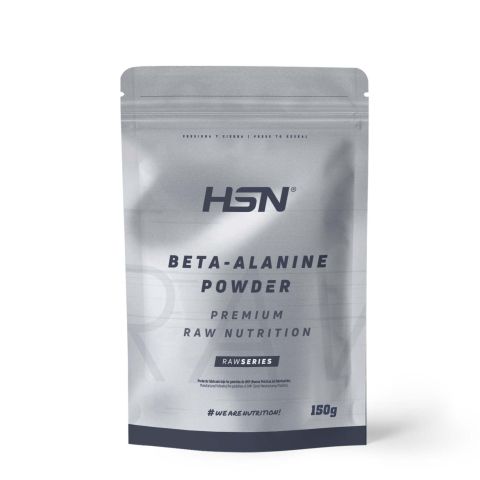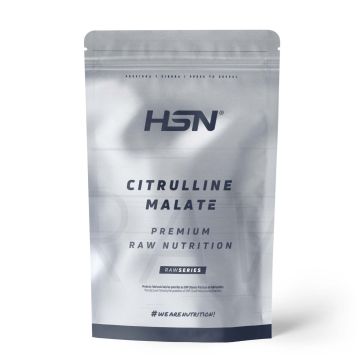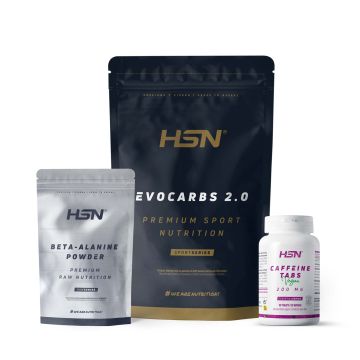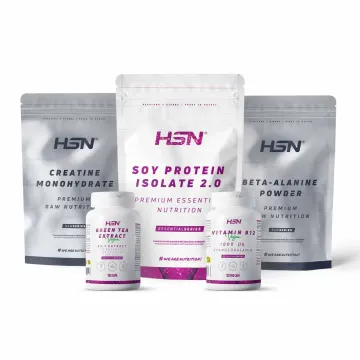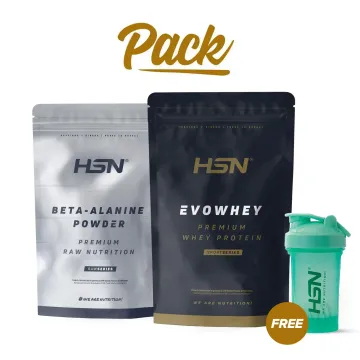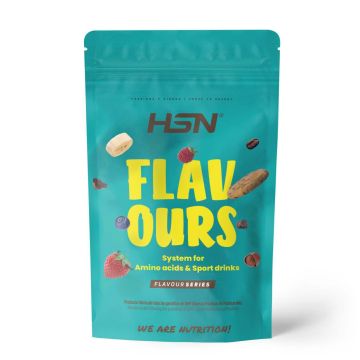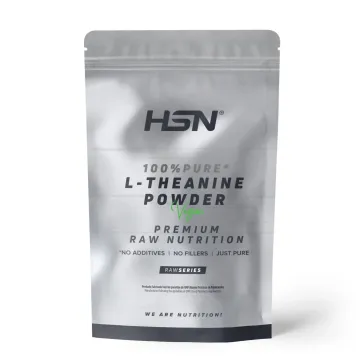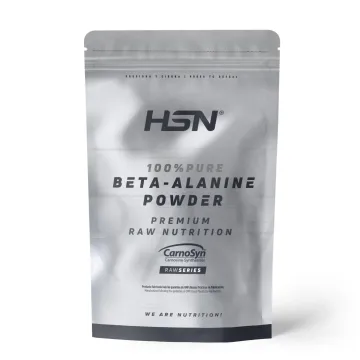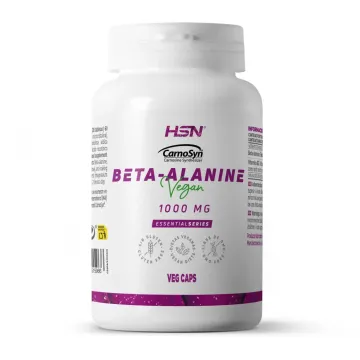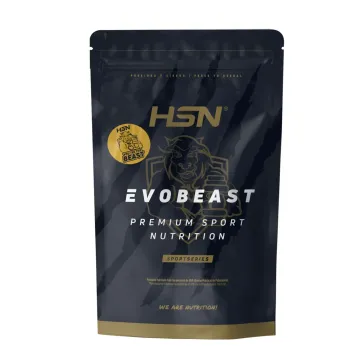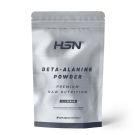Pure Beta-Alanine Powder - Top Quality with No Additives
Beta-Alanine powder from RawSeries is a dietary supplement developed solely and exclusively from a high-purity raw material of the amino acid ß-Alanine, with no additives, flavorless; ready to mix with other supplements commonly used by athletes.
Beta-Alanine is an amino acid derived from traditional (alpha-) L-Alanine, a proteinogenic amino acid found in protein-rich foods. Beta-Alanine is not proteinogenic, but it’s widely used by athletes, since this specific modification changes the amino acid’s mechanisms of action and scientific research on this compound looks promising for athletes.
At HSN you’ll find flavorless Beta-Alanine, ready to mix in water with other compounds commonly used in your supplementation routine. It’s fully suitable for vegan diets and free from added additives.
Discover one of the most popular amino acids among athletes
Beta-Alanine has earned its place in many athletes’ routines
Beta-Alanine has become one of the most popular dietary supplements among athletes, especially those undergoing intense and prolonged training. This is due to the large amount of scientific evidence published in recent years and the product’s ease of use, as it comes in various forms like powder or capsules, allowing athletes to easily include it in their daily routine.
Its use is backed by numerous scientific studies, which builds trust for those looking for a reliable sports supplement. We have highly reputable institutions supporting it, such as the International Olympic Committee, which in its scientific position declared beta-alanine as a “Dietary supplement with significant scientific evidence”.
Another factor boosting Beta-Alanine’s popularity is its market accessibility, making it attractive to a wide range of users, from amateurs to elite athletes. Right here at HSN, you’ll find a full category dedicated to beta-alanine with 5 different options, from powder products to capsules and tablets with various dosages and raw materials, but always top quality.
Find all our beta-alanines by clicking HERE.
Scientific research on Beta-Alanine that has sparked interest
Beta-alanine has attracted growing interest in the scientific community due to its potential use among athletes as a dietary supplement, especially in high-intensity activities. This amino acid was first identified in the 19th century, but it wasn’t until mid-20th century that researchers began exploring its specific role in the body. Early research focused on its natural presence in muscle fibers and its relationship with carnosine, a dipeptide formed when it binds with the amino acid L-Histidine. These studies laid the groundwork for future research aiming to understand how beta-alanine supplementation could impact users.
From the 1990s onward, beta-alanine gained significant attention in exercise physiology. Several studies, like those by Harris et al. (2006) and Hill et al. (2007), showed that beta-alanine supplementation had relevant potential for athletes, as it influenced carnosine levels. These initial studies encouraged the scientific community to dig deeper, leading to an exponential rise in scientific publications on beta-alanine in the following decades.
Over the last twenty years, beta-alanine has become one of the most researched dietary supplements in sports nutrition. A meta-analysis by Hobson et al. (2012) consolidated findings from numerous studies, showing clear sports-related use as a supplement. This ongoing interest has resulted in a robust body of literature, with recent research continuing to explore both beta-alanine’s effects and its long-term safety. The consistency and depth of beta-alanine research have established it as a highly relevant product in the scientific field.
In fact, we currently have key scientific trials from highly rigorous organizations endorsing this amino acid’s use among athletes:
- Maughan, R. J., Burke, L. M., Dvorak, J., Larson-Meyer, D. E., Peeling, P., Phillips, S. M., Rawson, E. S., Walsh, N. P., & Garthe, I. (2018). IOC consensus statement: Dietary supplements and the high-performance athlete. British Journal of Sports Medicine, 52(7), 439-455.
- International Society of Sports Nutrition. (2015). ISSN Position Stand: Beta-Alanine. Journal of the International Society of Sports Nutrition, 12(1), 30.
Pure development with the best raw material and no additives
The beta-alanine you’re looking at is one of the pure developments from HSN’s RAW range, its value proposition is that when you buy our beta-alanine you’re getting a pure product, essentially the same raw material we purchase wholesale, but packaged for convenient retail use.
If you want pure beta-alanine, ready to mix with other supplements in your arsenal, our raw beta-alanine powder is your best bet, as you’ll be buying beta-alanine with maximum purity guaranteed by the quality control of HSN Labs’ specialized raw material selection departments.
Particle size adjusted for good suspension
The adjusted particle size of beta-alanine is crucial to ensure good suspension in drinks because it directly affects solubility and mixture stability. Finer particles tend to disperse more evenly in the liquid, preventing rapid sedimentation and improving the drink’s texture and consistency. This is especially important in RAW supplements, where a stable suspension ensures more accurate dosing and a better consumption experience.
At HSN we’ve chosen a beta-alanine raw material with a mesh size tailored to our preferences, so we can offer you the best quality, not only nutritionally but also in terms of user experience.
Common combos in homemade pre-workout formulas
Beta-alanine is commonly combined with other ingredients in pre-workout supplements for athletes, and when you pick a RAW product, you get to mix them however you like.
One of the most common combos is with creatine, since both compounds are among the top supplements used by athletes. Remember, creatine improves physical performance in successive bouts of brief, high-intensity exercise.1.
Another frequent combo is with caffeine, a stimulant currently considered the most commonly found compound in pre-workout formulas.
Also, BCAAs (branched-chain amino acids) are often included in these formulas as a complementary addition to beta-alanine, which is another amino acid. This combo is usually paired with citrulline malate, one of the most used amino acids among athletes as a diet supplement.
These combos are designed to address different athlete interests, and you can find several or all of them, along with other key elements for athletes, in HSN’s pre-workout formulas. Check them out by clicking here.
Q&A - We’re here to help!
Should Beta-Alanine dosage be adjusted based on body weight?
No.
Beta-alanine is an amino acid used as a dietary supplement by high-intensity athletes. Unlike other products, beta-alanine’s effectiveness doesn’t directly depend on body weight, but on its relationship with carnosine, which isn’t influenced by anthropometric characteristics.
The effective beta-alanine dose is based on reaching a sufficient amount, without a direct link to individual weight, so a standard dose of 3 to 6 grams per day is generally recommended, regardless of body weight.
HSN’s beta-alanine powder has a recommended daily dose of 4000 mg, within the proven effective range.
My skin itches when I take beta-alanine, is that normal?
It’s normal to experience itching or tingling when taking beta-alanine due to an effect called paresthesia. This happens when beta-alanine binds to nerve receptors under the skin, causing a tingling or itching sensation, mainly on the face, neck, and limbs. Paresthesia is a temporary, harmless effect that usually lasts 60 to 90 minutes after taking a significant dose of Beta-Alanine. Although it can be uncomfortable, it’s not dangerous and tends to lessen over time or when splitting the dose into smaller portions throughout the day.
That’s why HSN’s total beta-alanine dose is split into 2 servings of 2 g each, to reduce this effect; still, more sensitive people will notice it and that’s normal and not negative.
Are there interactions between beta-alanine and caffeine?
Caffeine and beta-alanine can be used together as part of a pre-workout supplementation regimen, as no known negative interactions exist.
Caffeine and beta-alanine are frequently combined, often in ready-made pre-workout formulas by sports supplement brands, since many studies have validated that their combination is interesting:
- Kruszewski, M., Merchelski, M., Kruszewski, A., Tabęcki, R., Aksenov, M. O., & Pągowski, Ł. (2022). Effects of Multi-Ingredient Pre-Workout Supplement and Caffeine on Bench Press Performance: A Single-Blind Cross-Over Study. Nutrients, 14(9), 1750.
Should I take beta-alanine every day? Even on rest days?
Beta-alanine should be taken daily, even on rest days, because its effectiveness depends on the accumulation of this compound.
Scientific research shows that maintaining daily intake, even on non-training days, ensures sufficient beta-alanine levels, maximizing its benefits during workouts (Kerksick et al., 2018).
Scientific references
- Derave, W., Everaert, I., Beeckman, S., & Baguet, A. (2010). Muscle carnosine metabolism and beta-alanine supplementation in relation to exercise and training. Sports Medicine (Auckland, N.Z.), 40(3), 247–263.
- Javadi, S., Yousefi, R., Hosseinkhani, S., Tamaddon, A.-M., & Uversky, V. N. (2017). Protective effects of carnosine on dehydroascorbate-induced structural alteration and opacity of lens crystallins: important implications of carnosine pleiotropic functions to combat cataractogenesis. Journal of Biomolecular Structure & Dynamics, 35(8), 1766–1784.
- Kerksick, C. M., Wilborn, C. D., Roberts, M. D., Smith-Ryan, A., Kleiner, S. M., Jäger, R., … Kreider, R. B. (2018). ISSN exercise & sports nutrition review update: research & recommendations. Journal of the International Society of Sports Nutrition, 15(1), 38.
- Perim, P., Marticorena, F. M., Ribeiro, F., Barreto, G., Gobbi, N., Kerksick, C., … Saunders, B. (2019). Can the Skeletal Muscle Carnosine Response to Beta-Alanine Supplementation Be Optimized? Frontiers in Nutrition, 6, 135.
- Trexler, E. T., Smith-Ryan, A. E., Stout, J. R., Hoffman, J. R., Wilborn, C. D., Sale, C., … Antonio, J. (2015). International society of sports nutrition position stand: Beta-Alanine. Journal of the International Society of Sports Nutrition, 12, 30.
1 The beneficial effect is achieved with a daily intake of 3 g of creatine.
 Before
Before After
After During
During Morning
Morning Afternoon
Afternoon Night
Night Before
Before After
After During
During Morning
Morning Afternoon
Afternoon Night
Night Before
Before After
After During
During Morning
Morning Afternoon
Afternoon Night
Night









